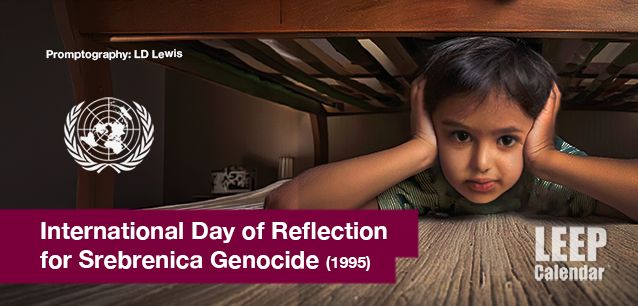 AD
AD
Today is: November 24
Scroll to explore events active on this date.
Additional Events on LEEP
LEEP INK FEATURES

August is Appropos
A toddler playing in the fountain at a park in Santa Fe, New Mexico—Photo LD Lewis. In August, we live through the Dog Days of Summer. It's hot and often humid, and those ...

September is Sassy
Can you hear that sigh of relief from parents worldwide? Yes! September marks the return of students to school, a global phenomenon. Preparations for the ACT and SATs begin earnestly for ...

OOH LA LA, October
October is the busiest month for events, with 5% more happening than in May, the second most eventful month. Sailing enthusiasts will be glued to the finals of this year's Am...
About the International Day of Reflection for the Srebrenica Genocide
Civil Rights , Legal
Politics , Eastern Europe
Ends: Jul 11, 2025
DESCRIPTION:
UN General Assembly Declares July 11 as International Day of Reflection and Commemoration of Srebrenica Genocide
On Thursday, May 23, 2024, the UN General Assembly designated July 11 as the International Day of Reflection and Commemoration of Genocide Jully 11-19, 1995, in Srebrenica, Yugoslavia (Bosnia). At least 8,372 people were killed, thousands displaced, and entire communities destroyed.
The resolution, adopted with the same title, also requested the Secretary-General to establish an outreach program on the Srebrenica genocide in preparation for the 30th anniversary next year.
In addition, the Assembly condemned any denial of the Srebrenica genocide and called on Member States to preserve the facts through educational systems, aiming to prevent denial, distortion, and future occurrences of genocide.
The resolution, sponsored by Germany and Rwanda, was adopted by a recorded vote of 84 nations in favor, 19 against, and 68 abstentions.
THE SREBRENICA GENOCIDE
The Srebrenica genocide represents one of the darkest chapters of the war that followed the breakup of the former Yugoslavia. In July 1995, the Bosnian Serb army overran Srebrenica, a town declared a safe area by the Security Council and brutally murdered thousands of men and teenagers. The Bosnian Serb forces also expelled 20,000 people from the city. A small and lightly armed unit of Dutch peacekeepers under the UN flag was unable to resist the Bosnian Serb forces.
The brutal killings of Bosnian Muslims in Srebrenica by the army of Republika Srpska have been recognized as genocide by the International Criminal Tribunal for the Former Yugoslavia (ICTY) and the International Court of Justice (ICJ).
GLOBAL REACTION TO THE NEW DAY
Volker Türk, UN High Commissioner for Human Rights, welcomed the resolution as "further recognition" of the victims and survivors and their pursuit of justice, truth, and guarantees of non-recurrence.
"The resolution is all the more important given the persistent revisionism, denial of the Srebrenica genocide, and hate speech by high-level political leaders in Bosnia and Herzegovina, as well as in neighboring countries," Türk stated.
GERMANY: Antje Leendertse, Ambassador and Permanent Representative of Germany to the UN, stated that the initiative was about honoring the victims and supporting survivors "who continue to live with scars of that fateful time."
Leendertse clarified that the resolution "is not directed against anybody" but is aimed at the perpetrators of the genocide.
SERBIA: President Aleksandar Vučić of Serbia criticized the resolution as "highly politicized," claiming it would "open a Pandora's box."
"This is not about reconciliation, not about memories; this is something that will just open an old wound and create complete political havoc. Not only in our region but even here, in this hall," he argued.
The commemoration of the day and remembrance of the event was established during the week leaders in Israel and Palestine's Gaza Strip were issued memorandum of intent to secure arrest warrants by the ICC for the unfolding genocide in Gaza, which has displaced 2.3 million people, killed over 35,000 and destroyed 80% of all housing, infrastructure and culture in a besieged area the size of the island of Manhattan in New York City. Like Serbia, those accused deny they're guilty of anything.
VIDEOS
SUPPORTING DOCUMENTS
Currently, this event does not have supporting documents.
ADDITIONAL IMAGES
Currently, this event does not have supporting images.
Where would you like to go now?
 AD
AD


/footer-logo.svg)
